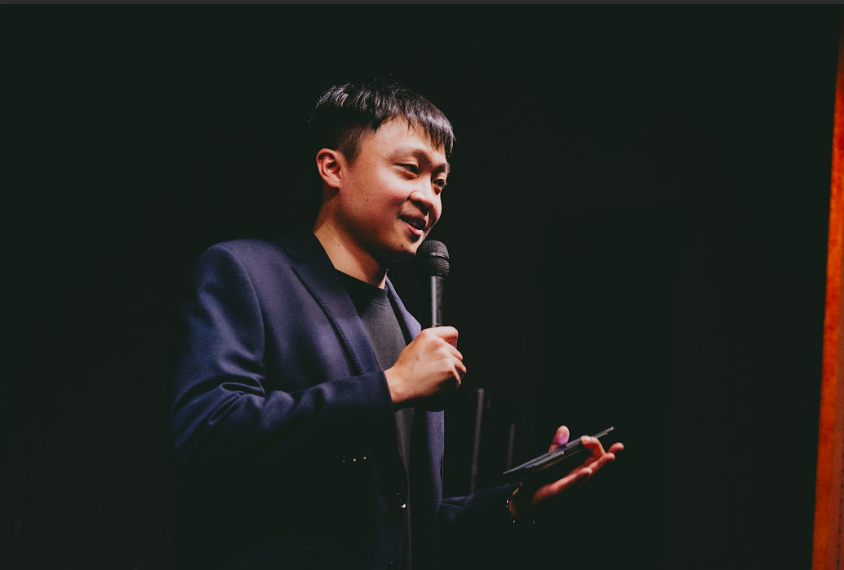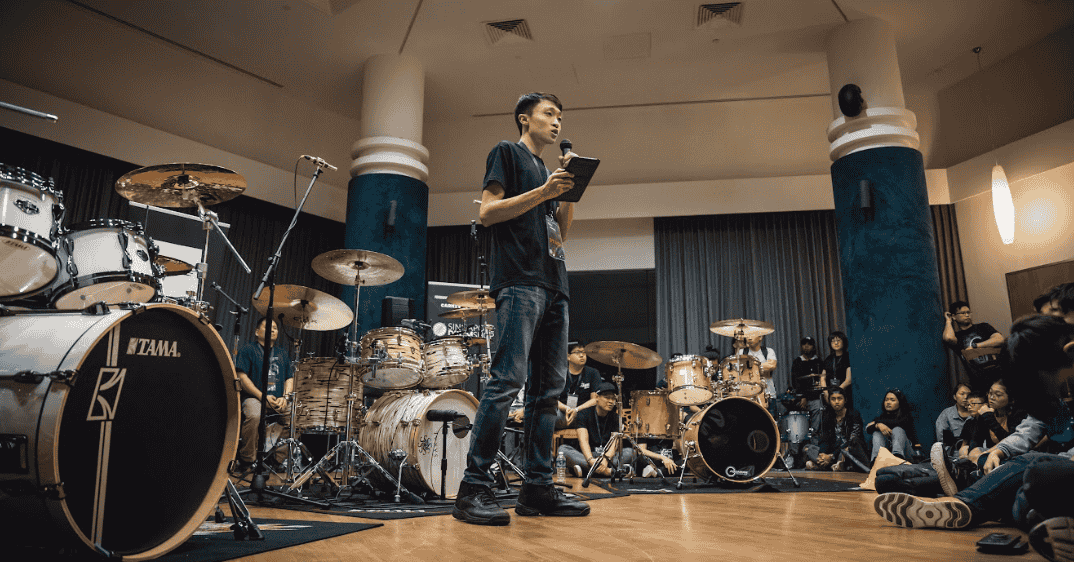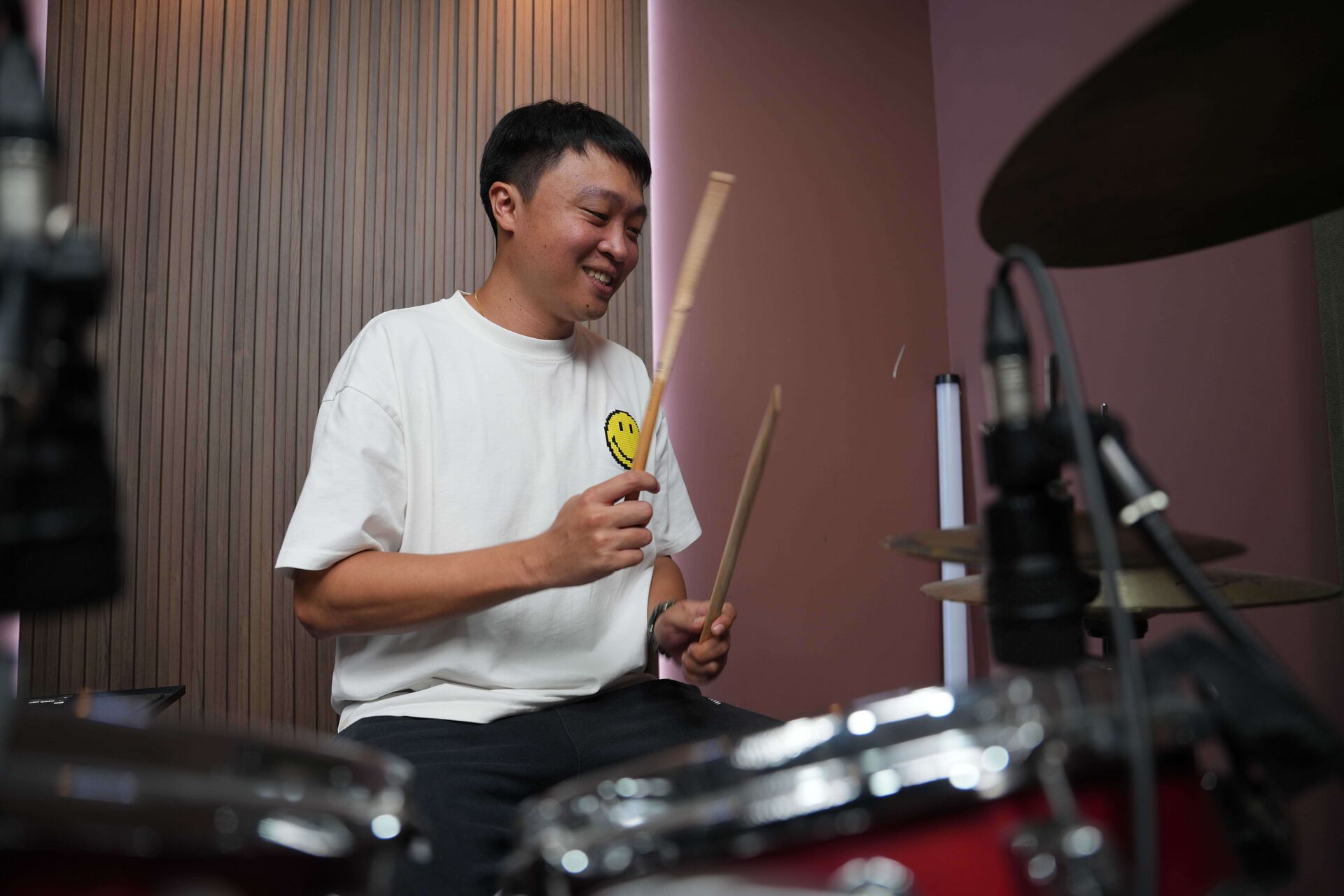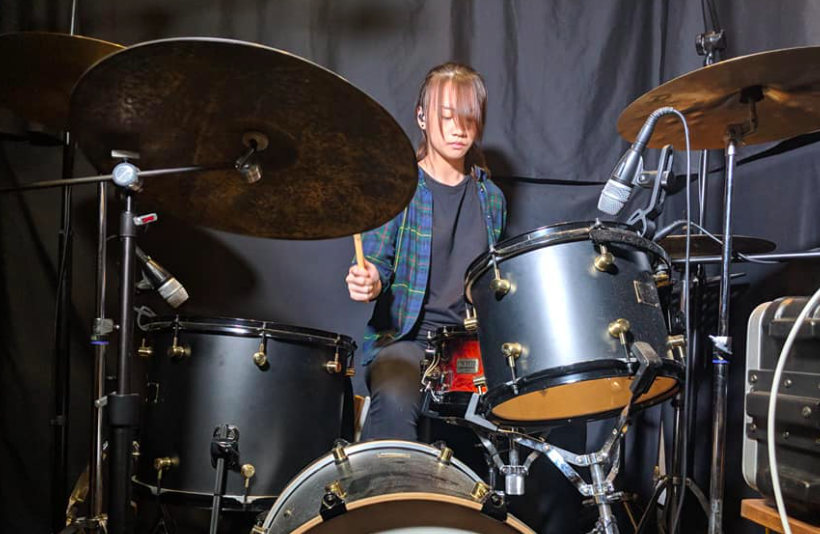It’s easy to think of drums as loud, aggressive, and overwhelmingly masculine — but Dane Tan wants to change that beat. As the founder of Drum Tannery, a Singapore-based drumming school dedicated to inclusivity, he’s on a mission to prove that drumming is for everyone: kids on the spectrum, women challenging stereotypes, and hobbyists just finding their groove.
A chemical engineering grad turned music educator, Dane’s journey is rooted in passion, not prestige. After years in the financial world, he pivoted back to his true calling — teaching — and built Drum Tannery to be a space where drummers can feel the full power of the kit. Here, students learn on real acoustic drums, train with full-time instructors, and play loud without fear of complaints, thanks to next-level soundproofing.
In this candid Q&A, Dane talks about what sparked his mission, why inclusivity matters in music education, and how even the slowest student can eventually find their rhythm.

You went from chemical engineering to music — what was that turning point like for you?
When I was younger, I could never reconcile with the fact that music could be a viable career. Even though I had a deep interest in music, I chose Chemical Engineering as a diploma. Every year I contemplated applying for a change of course, but never had the courage.
That was also the period in which I started teaching, intending to earn some quick bucks, but that was the time I discovered my passion for teaching. I loved to see students’ eyes sparkle when they discovered something new. That was when I knew opening a drum school was something I wanted for myself in the future.
I joined my father in the financial industry with the prospect of earning money. My goal at that point was simple: earn my first bucket of gold, and open a drum school “just for fun.”
The turning point came four years into the financial industry when my mental energy was drained. My wife (girlfriend back then) convinced me to look deeper into teaching. I ran many projections and talked to many friends in the industry. I saw my friends who persisted in their passion becoming producers and artists. That was when I decided to set my own pathway to make my passion my career, and it has never for a single day been unfruitful since.
View this post on Instagram
What sparked your realisation that drumming needed a more inclusive space — and how did that shape Drum Tannery?
I had my first encounter with students on the spectrum when I was 21, taking over a school for one day as a part-time teacher. I was untrained and the class went out of control. After the lesson, I was shocked but intrigued. That was my first exposure to the world of autism, and I started looking into it whenever I could.
Since then, I have spoken to every counsellor and special needs educator I came across. I also looked into how drumming can help children manage themselves, have better self-control and regulation, and improve attention span. I knew this was something every instructor needed to be equipped with, and that is what I aimed to do when I started the school.
Can you share more about how drumming has helped students on the autism spectrum — and what you’ve seen firsthand?
I talked to a parent to understand more about their story and how drumming helps their son to manage his emotions, self-regulate, and improve attention span. My goal was no longer how fast he could pick up beats, but small things like how many more repetitions he could do, how to handle frustration, and how to identify his emotions.
Throughout two years, I watched as he progressed from a boy who could not sit through four bars without a tantrum to playing multiple full songs. That achievement was a testament not to his drumming abilities, but to his growth in maintaining composure, knowing when to take breaks, and learning to accept mistakes. I was proud of him.

Why is it important that students learn on acoustic kits instead of electronic ones?
Electronic drums cannot replicate the energy and intensity of acoustic drums. The heart of drums is about how different strikes create natural resonance, controlling that resonance to spark ideas and drive your playing.
I would almost never recommend learning solely on an electric drum for beginners unless closely guided. Electronic drums trigger once impact is detected, regardless of how it was made. This often results in students developing bad habits. We have had multiple students who learned for years but once on acoustic drums, could not play correctly.
That being said, coordination learned on electronic drums can be translated into acoustic after correcting techniques. Electronic drums are an excellent practice tool, especially in Singapore’s environment, but proper techniques on acoustic drums are essential.
You’ve put serious effort into soundproofing your studio — what does it mean for a student to hear their drumming at full intensity?
Muted acoustic drums with noise reduction sacrifice power and resonance. We chose strategic locations and invested in resources to have true acoustic kits in all locations. Students can experience the full dynamic range of drums, balance sounds, and learn to handle actual hardware.
We complete the experience with full speakers with dynamic range. The speakers in our rooms cost more than two drumsets combined, to allow students the best playing experience. We are currently exploring IEM options to go with the speakers, so they can feel the bass in their body and have more clarity.

How do you train your instructors to maintain both consistency and creative freedom?
We believe music learning must involve a deep personal connection with the instructor. Some schools force instructors to follow a fixed syllabus, others give complete control. We build our syllabus by topic blocks, but do not restrict the instructors by flow.
This allows instructors to have their input based on what they feel is the fastest pathway for students to excel, adjusting for student needs and interests. The prerequisite is that the instructor must be competent. That is why we focus a lot on hiring full-timers and training them rigorously.
Our ultimate goal is not to cover all exercises extensively, but to build students up to be competent and confident enough to be self-motivated and self-learn even outside of the classroom. We call that the tipping point, from hobbyist to true enthusiast.
What are some of the most unexpected lessons you’ve learned from your students?
I had one student who could not get the simplest beat going on, even after six months of lessons. I tried every single method, and it didn’t work. He was not lazy, but I felt like giving up. Two years later, I saw a video of him playing an entire song by himself. I was blown away.
That was the point where I truly understood that everyone is capable of learning and achieving their goals as long as they put their mind to it. This shaped my mentality in handling all future students. As long as the student shows up, regardless of progression, we will give it our best to let them have a fruitful and enjoyable lesson.

If drumming were a metaphor for life, what’s the biggest thing it’s taught you?
Going with the flow is key. More haste, less speed. Practice slowly, let your body achieve its most natural and efficient way before you speed up. When you are ready to speed up, you will realise you can play much cleaner, consistent, and faster. This is counterintuitive for beginners but once embraced, you can feel a big difference.
The same can be said in life. Forcing and controlling every situation will only result in more trouble. You can nudge things along to achieve your goals, but ultimately, you will have to go with the flow and deal with things as they come.
How do you hope your school reshapes how the next generation views drumming?
Our generation has been much more accepting of drumming as a hobby, and it has transcended gender stereotypes. In fact, more than half of our adult students are female. This is already a huge progression from our parents’ time.
My goals, along with many industry friends, is to make drumming a common hobby, next in line with yoga, pilates, and MMA. We started a drumming community group called DrummerCo, working with *SCAPE to bring drummers together through events like drumming festivals and workshops.
View this post on Instagram
What do you envision for the future of Drum Tannery?
We are not looking to be the biggest player in the industry. We want to provide the best drumming education in Singapore and a well-paying and stable career path for aspiring musicians. We want Drum Tannery to be a brand that both students and instructors can be proud of when they speak to their friends.



